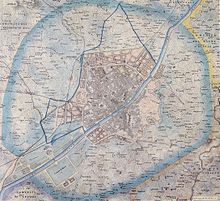Giuseppe Poggi
Giuseppe Poggi (born April 3, 1811 in Florence ; † March 5, 1901 there ) was an Italian architect and town planner.
Life
After Giorgio Vasari and Bernardo Buontalenti, Poggi was the architect who, in his era, the 19th century, shaped the face of today's Florence most decisively. He built for the upper class, such as the Villa Favard on the Lungarno , the Palazzo Gondi , the Palazzo della Gherardesca and was successful and influential with his neo-Renaissance style, which was adapted to the local ambience . He showed himself to be open to modern trends such as parks in the English style and renovation projects in the style of Georges-Eugène Haussmann .
In 1864 Poggi was commissioned to design guidelines for the urban development of Florence. In the wake of the demolition of the city wall in the northern part of the city, Poggi designed the resulting boulevards ( Viali di Circonvallazione ), with some monumental squares such as the ( Piazza Beccaria , Piazza della Libertà ), whereby the city gates of the 14th century were preserved. Poggi found a particularly original solution for the Piazzale Donatello , when he received the “Cemetery of the English” ( Cimitero degli Inglesi ) and framed it with cypress trees . Arnold Böcklin is said to have been inspired by this ensemble for his painting: Die Toteninsel .
On the south bank of the Arno, Poggi created the viale dei Colli with the highlight of the Piazzale Michelangelo .
Poggi's brother Enrico Poggi (1812–1890) was a prominent figure in Italy in the 19th century: he was Minister of Justice in the Grand Duchy of Tuscany and in the provisional government of Tuscany. As such he proclaimed the annexation of Tuscany to the Kingdom of Sardinia and was subsequently minister without portfolio of the Kingdom of Italy.
literature
- Carlo Del Lungo: Cenni sulla vita e sui lavori dell'architetto Giuseppe Poggi. Civelli, Florence 1911.
- Franco Borsi: La capitale a Firenze e l'opera di Giuseppe Poggi. Colombo, Rome 1970.
- Elisabetta Maria Agostini: Giuseppe Poggi. La costruzione del paesaggio. Diabasis, Reggio Emilia 2002, ISBN 88-8103-354-2 .
- Vanna Arrighi, Scheda su Giuseppe Poggi. In: Elisabetta Insabato, Cecilia Ghelli (ed.): Guida agli archivi di architetti e ingegneri del Novecento in Toscana. Edifir, Florence 2007, ISBN 978-88-7970-351-2 , pp. 297-300.
Web links
| personal data | |
|---|---|
| SURNAME | Poggi, Giuseppe |
| BRIEF DESCRIPTION | Italian architect |
| DATE OF BIRTH | April 3, 1811 |
| PLACE OF BIRTH | Florence |
| DATE OF DEATH | March 5, 1901 |
| Place of death | Florence |

